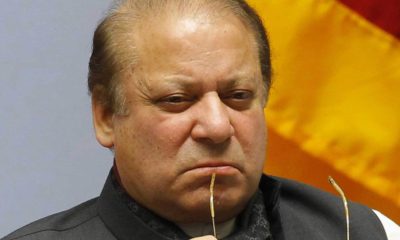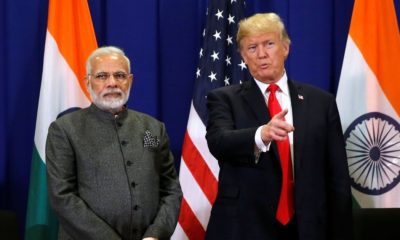World
Pakistan apex court upholds Lakhvi’s detention order

Islamabad: The Supreme Court of Pakistan Wednesday overturned the suspension of detention of Zakiur Rehman Lakhvi, the alleged mastermind of the 2008 Mumbai terror attacks. He will remain in jail, the court has ordered.
The apex court has sent the case back to the Islamabad High Court (IHC) to hear the arguments of both parties without rushing through it.
The case will be heard again Jan 12.
The apex court declared the IHC’s order releasing Lakhvi from jail as void, and said he will remain in jail.
Lakhvi was arrested in February 2009 and was indicted along with six others Nov 25, 2009, for planning and helping to carry out the Mumbai terror attacks.
He was believed to be the operational chief of the Lashkar-e-Taiba (LeT), which has been accused by India of carrying out the attacks in Mumbai.
The 2008 attacks, when ten Pakistani gunmen rampaged through Mumbai for three days, sent bilateral relations into deep freeze. India blamed the Pakistan-based militant group LeT for the attack and handed over intercepts to use as evidence in the Lakhvi case.
One Pakistani terrorist, Ajmal Kasab, caught alive was tried and convicted of the attacks, and sentenced to death by a special court in Mumbai. He was executed Nov 21, 2012
World
Lockdowns in China Force Urban Communities to Defy Censorship and Vent Frustration Online

Shanghai’s rich middle class is leading a wave of online dissent over the strict and prolonged lockdowns imposed in various parts of the country. Chinese internet censorship is struggling as patience is wearing thin in many urban centers, coming up with creative forms of online protests.
Social Media Posts Revealing Lockdown Tension in Shanghai
Drawn-out lockdowns are nothing new in China as authorities insist with the nation’s zero-Covid policy since the start of the pandemic. Currently over This time around, however, metropolitan areas like Shanghai are increasingly difficult to keep quiet, given that its more than 25 million residents have seen weeks of total isolation along with food shortages and many other service interruptions.
Dozens of towns and reportedly over 300 million Chinese citizens have been affected by lockdowns of different severity. As expected, urban netizens have been most outspoken over their difficulties by finding creative ways to get around state censorship and bans placed on topics, news comments and spontaneous campaigns.
Shanghai residents have been using mobile proxies and hijacking seemingly unrelated hashtags to talk about healthcare issues, delivery failures and the overall severity of their situation. The “positive energy” that the Chinese government wants to transmit during the recent prolonged series of lockdowns does not come naturally to those counting food supplies and online censors are working hard to filter words, trending topics and undesired social media sharing.
WeChat groups and message threads are under constant monitoring. Posts questioning the zero-Covid approach have been quickly deleted, including by leading Chinese health experts like Dr. Zhong Nanshan. Video footage is soon censored and protests and investigations are quickly made to disappear.
Where this has not worked, officials have exposed banners with warnings and outright threats like “watch your own mouth or face punishment”, while drones have been patrolling the city skies. Yet, if anything, this has led to further tensions and unspoken confrontation with Shanghai’s educated and affluent middle class.
Creative Online Solutions Harnessing Civic Energy
Announcements by Chinese social media that they would be publishing the IP addresses of users who “spread rumors” have not helped either. Tech industry research has shown that much of Asia’s tech-savvy population has a habit of using mobile proxies and other privacy tools, quickly finding workarounds to browse the internet freely and talk to the world about the hottest topics.
The sheer volume of forbidden posts is already a challenge for the very censorship system, experts explain. Unable to track all trending hashtags, state workers overlook topics that speak about the US, Ukraine or other popular news. Linking human rights elsewhere to their situation, Chinese online dissidents establish their informal channels and “hijack” the conversation to share personal or publicly relevant information about the Covid suppression in their town.
Sarcastic and satirical posts still dominate. Others hope to evade the censors by replacing words from famous poems or the national anthem. One thing is certain – social media, when harnessed with the right creativity, has proven its ability to mount pressure on the government in even some of the most strictly controlled tech environments like China.























